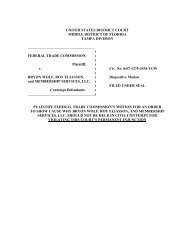Gasoline Price Changes - Federal Trade Commission
Gasoline Price Changes - Federal Trade Commission
Gasoline Price Changes - Federal Trade Commission
Create successful ePaper yourself
Turn your PDF publications into a flip-book with our unique Google optimized e-Paper software.
GASOLINE PRICE CHANGES:<br />
2004 as in 2003. Some consumers face difficult choices when budgeting for these higher<br />
gasoline expenditures.<br />
Profits, however, play necessary and important roles in a well-functioning market<br />
economy. Moreover, profit levels in the oil industry – as in other industries – have been variable<br />
over time and among firms. This section reviews the roles that profits play in a healthy market<br />
economy and gives a historical perspective on profitability in the oil industry.<br />
A. Profits Play Necessary and Important Roles in a Market Economy.<br />
Profits play two necessary and important roles in a market economy. First, profits<br />
compensate owners of capital for the use of the funds they have invested in a firm. The level of<br />
profits for a firm, as well as the rate of return on those investments in that firm, will be<br />
influenced by supply and demand, in addition to regulatory conditions. Second, profits are a<br />
reward for an investor’s willingness to bear the risk that an enterprise will not be successful and<br />
the investment will be lost. If the enterprise instead is successful, an investor may receive a high<br />
rate of return. High rates of return signal possible profit opportunities and thus encourage<br />
investors to reallocate resources across the economy, investing new capital in areas of high rates<br />
of return.<br />
Profits play the same roles in the oil industry. The oil industry, which produces more<br />
than 80 million barrels per day of petroleum products, is one of the largest in the world. A great<br />
deal of investment must support the enormous infrastructure required to find and produce crude<br />
oil, transport it to refineries, produce finished petroleum products, and distribute these products<br />
throughout the world. Investors expect compensation for the use of their funds in supporting this<br />
business.<br />
Profits also compensate firms for taking risks. The oil industry faces many types of risks.<br />
Potential changes in the macroeconomic climate, at either the national or the global level, and<br />
general uncertainty about future prices pose investment risk for all industries, including oil.<br />
Other risks are more specific to the oil industry. For example, production levels may be lower<br />
than expected at an oil field, or war or terrorism, in some areas, may destroy crude production<br />
assets or reduce their values. At downstream levels, refinery margins may fall if the price of<br />
gasoline falls relative to the price of crude oil. New environmental requirements may increase<br />
operating costs or require substantial new capital investments. Over the longer run, energysaving<br />
innovations at the consumer level may reduce the demand for refined petroleum products.<br />
That these risks did not come to pass in any particular year may make investments look very<br />
profitable in hindsight. That does not necessarily mean, however, that firms should have<br />
invested more based on the information about risks that firms had at the time.<br />
60<br />
B. Profits in the Oil Industry Have Varied Over Time, Over Industry Segments,<br />
and Among Firms.<br />
EIA’s Financial Reporting System (FRS) tracks the financial performance of the major<br />
FEDERAL TRADE COMMISSION, JUNE 2005
















